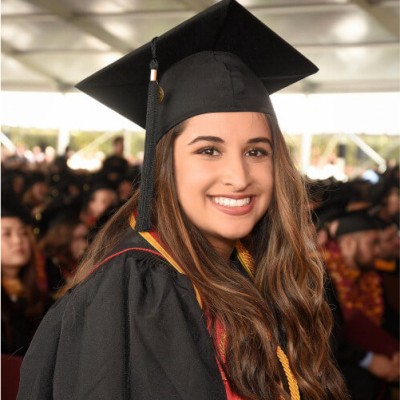
In this series of alumni profiles, we highlight graduates of USC’s master of science program in stem cell biology and regenerative medicine. Our accomplished alumni have pursued many different paths—ranging from a biotech industry job to a teaching career, and from a PhD program to professional degrees in medicine, dentistry, and law. Forty-one master’s students graduated as part of the Class of 2022, we are delighted to welcome them into our vibrant, diverse, and growing community of alumni. Congratulations Class of 2022, and Fight On!
–Francesca Mariani, master’s program director
During an undergraduate summer internship at the biopharmaceutical company Pharmacyclics, Anika Gidwani found herself more intrigued by legal questions than scientific ones—even though she was pursuing a bachelor’s degree in neuroscience and a progressive master’s degree in stem cell biology and regenerative medicine at USC.
“It goes back to the very reason why I loved science in the first place,” said Gidwani, who also did an undergraduate summer internship at Amgen in San Francisco. “From the very onset, I wanted to know: how do we take this information and use it to help people? At Pharmacyclics, I remember talking to my boss about it, and he said, ‘Honestly, if this is something you’re interested in, you should go talk to our general counsel about how clinical trials are set up here.’ That made me realize that the law is really what I was the most interested in, but within an arena where I could still be involved in science.”
Growing up Saratoga, California, Gidwani looked to her own mother as a role model of a scientist with a career that doesn’t involve doing experiments in a laboratory. Her mother earned a master’s degree in biochemistry and started her career as a scientist in the biotech industry, before successfully transitioning into regulatory affairs for companies including Gilead Sciences, Abbvie, and Allogene Therapeutics. Meanwhile, her father worked as an engineering consultant, solving difficult hardware and software problems for tech companies.
Not long after arriving at USC, Gidwani took an elective course called MEDS 335 Human Development: From Stem to Sternum, taught by Neil Segil and Senta Georgia. The course convinced her to pursue a progressive master’s degree in stem cell biology and regenerative medicine at USC.
“Regenerative medicine and stem cells are the future of medicine, and where the biotech industry has the most opportunity for growth and for making that technology accessible,” she said. “In addition to intellectual property, there are huge bioethical questions that people don’t have the answers to, because we’re on the cutting edge of science, and the law is so far behind where we are scientifically. And so how do we modernize the law and make it encompassing of where we are as a society and will continue to be in the future? Those were all the big things that I wanted to know about.”
Through the master’s program, she took the course SCRM 515 Bringing Stem Cells to the Clinic, taught by Justin Ichida and Qing Liu, which addresses the business, legal, ethical, manufacturing, and regulatory aspects involved in moving stem cells or related products into clinical practice. One of the course’s guest speakers worked at the USC Stevens Center for Innovation, the University’s technology licensing office, and ended up offering Gidwani a job.
“I ended up working there all throughout my master’s program,” she said. “My job was finding licensing partners at major biotech companies who would be interested in the research that USC was doing.”
At the same time, as a member of USC’s mock trial team, Gidwani noticed that many of the cases involved witnesses with expertise in toxicology, forensics, or other technical or scientific areas.
“It made me realize there need to be lawyers who can parse through scientific material and ask probing questions,” she said.
By the time she graduated from USC, she had settled her ambitions on law school, and was accepted into the JD program at the University of California, Davis.
During the notoriously competitive first year, she had insecurities about not having pursued a more typical law school major, such as political science or business. But she began to recognize her bioscience background as one of her best advantages.
“Being a scientist has always given me a certain level of problem solving skills,” she said. “I’m able to synthesize information, concisely repeat it back, and plan and think and use evidence in order to support a conclusion. I also know how to read deeply difficult material, like a scientific paper on a topic I know nothing about, and how to parse that and come away with the takeaway.”
In the future, she hopes to launch her legal career as part of a life sciences practice group at a law firm.
“There are so many amazing firms all throughout the country that do a lot of work in the biotech and tech sphere,” she said. “And every single aspect of developing a drug and taking it to becoming a therapeutic requires the law.”
